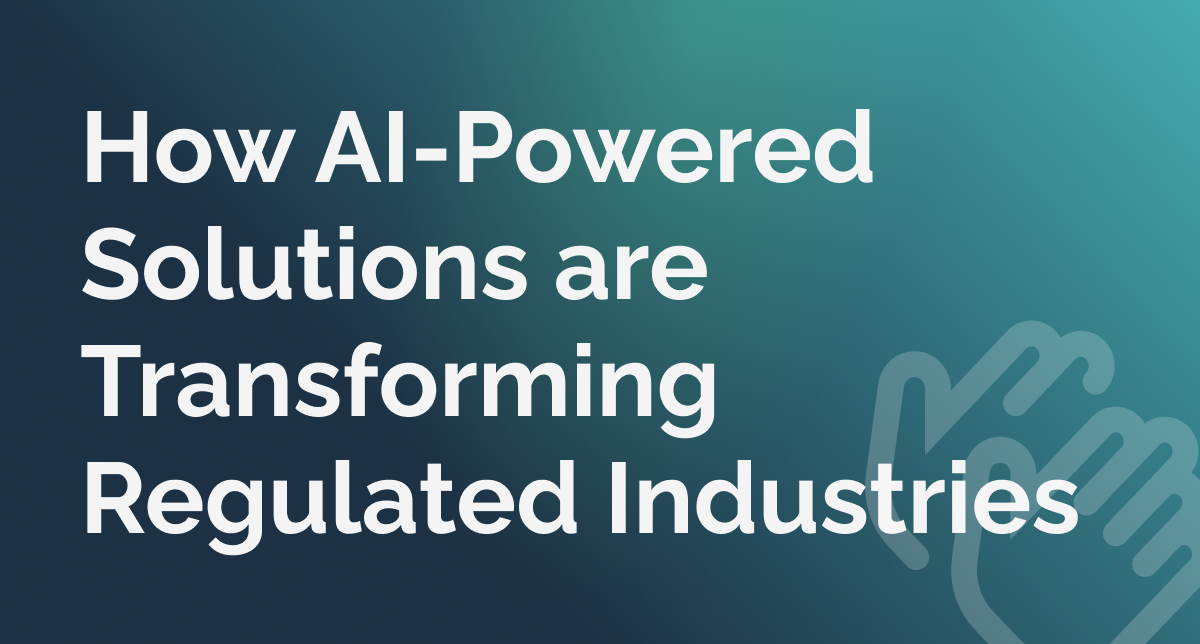Industries operating in highly regulated environments – such as pharmaceuticals, finance, and healthcare – are under constant pressure to maintain compliance, accuracy, and operational efficiency. As regulations become increasingly complex and the volume of data grows exponentially, traditional approaches are often too slow and prone to error. This is where AI-powered solutions are making a substantial impact.
By automating and enhancing manual processes, AI is reshaping how businesses in regulated industries operate. From compliance management to document accuracy and risk reduction – AI-powered tools are transforming the landscape.Why Regulated Industries Are Turning to AI
For industries dealing with strict regulations, ensuring compliance and accuracy is not optional – it’s mandatory. However, this can be an overwhelming task, particularly when dealing with massive amounts of data and stringent documentation standards.Here’s why AI is increasingly becoming a game-changer for these sectors:
- Automation of Repetitive Tasks: AI can take over manual, time-consuming tasks such as data entry, document comparison, and regulatory reporting. Automating these processes allows teams to focus on higher-value activities and reduces the risk of human error.
- Improved Data Accuracy and Consistency: AI-powered solutions can process vast amounts of data with greater speed and accuracy than human reviewers. This is a significant advantage for industries where data accuracy is crucial – such as financial transactions or pharmaceutical trials.
- Enhanced Compliance Management: Regulations constantly evolve, making it difficult to keep track of new rules and ensure that every document or process meets compliance standards. AI can analyze regulations in real-time, ensuring that businesses stay compliant with the latest requirements.
- Scalability and Efficiency: As industries grow, the volume of data and documentation grows too. AI solutions can easily scale to meet these demands, processing thousands of documents or transactions in a fraction of the time it would take the human eye or a manual team.
Key Applications of AI in Regulated Industries
AI is not just a buzzword – it’s already delivering tangible benefits across a range of regulated industries. Here are some key applications:
Pharmaceuticals: Enhancing Drug Development and Safety
The pharmaceutical industry faces strict regulations, particularly when it comes to drug development, testing, and safety. AI is playing a pivotal role in:
- Clinical Trials: AI tools can quickly analyze vast datasets from clinical trials, identifying trends, potential side effects, or inconsistencies in the data.
- Document Comparison: In drug labeling and regulatory submissions, accuracy is critical. AI-powered document comparison tools ensure that every piece of content matches perfectly across different versions, reducing the risk of errors.
- Pharmacovigilance: AI can automate the process of monitoring and reporting adverse drug reactions, helping companies meet their regulatory obligations more efficiently.
Finance: Managing Risk and Compliance
In the financial sector, regulatory compliance is complex, and the stakes are high. AI can help firms manage risk and compliance by:
- Fraud Detection: AI algorithms can analyze transaction data in real-time to detect unusual patterns that might indicate fraud.
- Automated Compliance Monitoring: AI tools can keep track of regulatory changes and automatically flag potential compliance risks in financial transactions or reports.
- Customer Due Diligence: AI can streamline Know Your Customer (KYC) processes, ensuring financial institutions comply with regulations while onboarding new clients more efficiently.
Healthcare: Improving Patient Care and Data Management
Healthcare is another industry where regulations, particularly around patient data privacy, are stringent. AI is helping to manage compliance while also improving patient care:
- Medical Imaging: AI-powered tools are increasingly used to analyze medical images, detecting anomalies with greater accuracy and speed than human radiologists.
- Data Privacy: AI tools can monitor how patient data is accessed and used, ensuring that healthcare providers remain compliant with data privacy regulations such as HIPAA.
- Electronic Health Records (EHR): AI can analyze EHRs for inconsistencies or missing information, ensuring that patient data is accurate and up-to-date.
Challenges and Considerations When Implementing AI
While AI offers numerous benefits, businesses in regulated industries must approach its adoption carefully. Here are some considerations:
- Data Security and Privacy: AI systems rely on large amounts of data to function effectively. In industries like healthcare and finance, this data is often sensitive. Ensuring that AI tools comply with data privacy laws is crucial.
- Explainability and Transparency: In regulated industries, it’s not enough to get results—businesses often need to understand how those results were reached. AI systems, especially those using machine learning, can sometimes act like “black boxes,” making it difficult to explain their decision-making processes. Businesses must ensure that the AI tools they use are transparent and explainable to meet regulatory standards.
- Regulatory Compliance: AI systems themselves may need to comply with certain regulations, particularly if they are used in decision-making processes. Ensuring that AI tools meet industry-specific regulatory requirements is critical.
- Human Oversight: While AI can automate many tasks, human oversight is still essential. AI tools should be used to augment human decision-making, not replace it entirely. Ensuring that qualified professionals are still involved in critical decisions will be key to maintaining regulatory compliance and trust in AI systems.
The Road Ahead for AI in Regulated Industries
AI adoption in regulated industries is still growing, but its impact is already profound. As technology continues to evolve, we can expect AI to play an even more central role in helping businesses manage compliance, accuracy, and efficiency.
Looking ahead, we may see further integration of AI with blockchain technology to provide immutable records of compliance or the use of natural language processing (NLP) to interpret and apply regulatory changes to business processes automatically.
Ultimately, AI-powered solutions offer the potential to not only meet but exceed the demands of regulated industries, delivering better accuracy, efficiency, and scalability than ever before.
Conclusion
AI is transforming regulated industries by automating complex, error-prone tasks, improving data accuracy, and enhancing compliance. As the technology continues to evolve, its potential to reshape how businesses operate in highly regulated environments will only grow.




